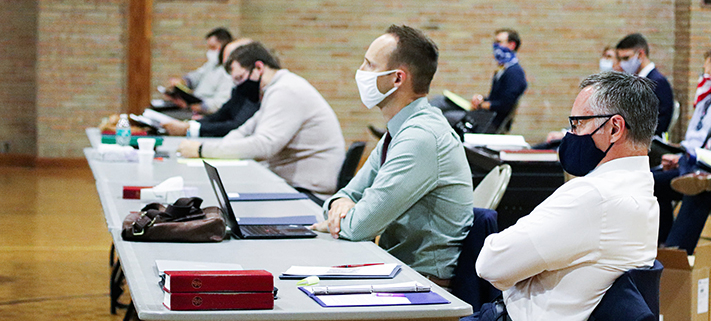Wisconsin Lutheran Seminary holds 2020 fall symposium
This year students and faculty of Wisconsin Lutheran Seminary, Mequon, Wis., attended the seminary’s annual fall symposium from Sept. 21 to 22. About 175 pastors and vicars from across the U.S. and Canada joined via livestream to hear three papers presented on Martin Luther’s 1520 Treatises.
To commemorate the 500th anniversary of four important treatises from Martin Luther, essayists reviewed them, shedding light on what was happening in the world at the time and explaining why the truths emphasized are still essential for Christians today.
Rev. Jason Oakland, Martin Luther, Neenah, Wis., began the symposium with his paper, “Luther’s Call to Action: A Consideration of To the Christian Nobility of the German Nation.” He shared, “Luther felt compelled to write to the nobility because the church was simply not interested in reforming itself. In addition, he felt the nobility had every right to step in and work for change because they too were royal priests and, due to their vocation as leaders in the Empire, might be able to assist in bringing about much-needed change.”
Rev. Benjamin Schaefer, Mt. Calvary, Redding, Calif., wrote the second paper, “Breaking Free: Martin Luther’s Babylonian Captivity of the Church in Context.” He discussed how “Luther attacks the very heart of Roman power over Christendom, namely, the sacramental system. His thesis is that the faithful were trapped under the pope’s tyranny, and God’s gifts had been replaced by the traditions and laws of men. Rome was more concerned with power and prestige than they were with setting souls free. The Christian’s life from cradle to grave was locked in this system of control and coercion. Luther wrote this tour de force to combat the abuses prevalent at every level of the church’s work and worship—nothing was spared from Luther’s scathing rebuke.”
For the final presentation, Rev. James C. Danell spoke on two of Luther’s essays in his paper “The Freedom of a Christian and Treatise on Good Works.” Danell, professor at Martin Luther College, New Ulm, Minn., noted, “It’s in his treatise The Freedom of a Christian that Luther presents the biblical, reformation doctrine of justification by grace through faith. His treatise On Good Works speaks to the sanctified life of the believer that springs fundamentally from his justification through faith in Jesus.”
The essays themselves are now available at wisluthsem.org.
Watch the presentations:
Luther’s Call to Action: A Consideration of To the Christian Nobility of the German Nation
Breaking Free: Martin Luther’s Babylonian Captivity of the Church in Context
The Freedom of a Christian and Treatise on Good Works

